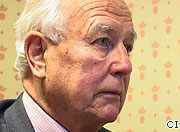The Government had to rely on Labour Peers and its own ministers to avoid defeat on a House of Lords motion regretting the impact of equality laws on religious liberty.
The motion was tabled by senior Conservative backbencher, Lord Waddington. It expressed regret at the unfair impact of equality laws on religious believers, and the bureaucratic burdens heaped on public bodies.
Speaking in the Lords debate on Tuesday Lord Waddington said: “We want to make it plain to people that there is real concern throughout the whole country. We stand for fair, not unfair, behaviour.”
Support
Over 70 backbench Tory Peers supported the motion. In total, Lord Waddington’s motion attracted the support of 126 Peers from across the House of Lords.
But he was opposed by 132 Labour Peers and 31 Tory Peers. Half of those Conservative Peers are Government ministers who would have been ordered to support the Government line.
Although the Government avoided defeat, it will be concerned that it had to rely on opposition Peers to do so.
Injustice
In the debate, Lord Waddington pointed to a long list of injustices suffered by Christians in the name of equality.
He said: “Noble Lords may remember the following instances: the woman threatened with the sack for being unwilling to perform civil partnership ceremonies even though she had worked for the council before civil partnerships were even invented; the nurse suspended for offering to pray for a patient’s recovery; the five year-old girl reprimanded for discussing her faith at school, and her mother, a worker at the school, investigated for professional misconduct because she asked for her friends’ prayers in the matter; the BA employee sent home without pay for wearing a silver cross; the council worker in Wandsworth sacked for suggesting to a terminally ill woman that she should seek help from God; Camden Council almost unbelievably saying that a Roman Catholic group had no right to advertise a meeting with the slogan, ‘Climate change is a Christian issue’.
Funding
“I am thinking of religious charities which have been finding it harder and harder to get local authority funding, with Brighton and Hove Council withdrawing funding from a residential care home because those running it refused to ask the elderly residents every three months about their sexual orientation.
“I am thinking of the five Catholic adoption agencies forced to close because of their unwillingness to place children with same-sex couples, although there are very many adoption agencies specifically catering for gay couples and the society’s objections could have been accommodated with no harm to anybody at all.”
Human rights lawyer and Lib Dem Peer, Lord Lester of Herne Hill, opposed Lord Waddington. Lord Lester said that religious liberty and freedom of conscience were already protected by existing laws.
Harmful
But Lord Tebbitt said, “Lord Waddington gave some of the examples of the way in which the Act has spawned action by Government and local government which is profoundly harmful, not least, as has been referred to, in the matter of adoption societies, and the discrimination against some religions.
“Not all religions, of course: it would be a bold local authority that would discriminate against, let us say, the Islamic religion. That would be a step too far; but of course Christians are easy meat, as we see day by day.”
Labour Peer, Lord Davies of Coity said “it strikes me that the pendulum of secularism and political correctness has swung too far. Consequently, we need to bring it back a bit.
Standards
“The way in which that can be done is by instilling more Christian standards and morality in our society.
“These regulations discriminate against religious bodies, as has been said by the noble Lord, Lord Waddington.”
Responding for the Government, Baroness Verma said: “My noble friend has made clear his concerns about the issue of religious freedom and its relationship with equality law.
Balance
“The Government are committed to striking a fair balance between religious freedom of expression and the rights of people not to be discriminated against whether at work or at school and when buying goods or using services. A fair balance is what the Equality Act 2010, and the legislation it replaced, achieves.”
Lord Waddington’s motion was defeated by 258 votes to 126.

